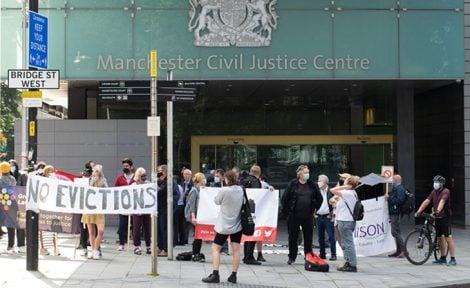PRS under stress
With Michael Gove, architect of the Renters’ Reform Bill back in charge, what does it mean for the private rented sector? Richard Reed talked to industry experts.

Landlords are leaving the housing sector in droves – and right now, letting agents are increasingly fearful for their future. The ever-increasing burden of compliance, coupled with the loss of mortgage interest relief, started the move towards the exit. Now the Renters’ Reform Bill – arguably one of the most controversial pieces of housing legislation ever proposed – has turned that trend into a stampede.
 With the return of the bill’s architect, Michael Gove, as Secretary of State for Levelling Up, Housing and Communities, is this a pivotal moment in the future of the lettings industry?
With the return of the bill’s architect, Michael Gove, as Secretary of State for Levelling Up, Housing and Communities, is this a pivotal moment in the future of the lettings industry?
A survey of 1,500 landlords recently showed that a quarter of those who served a Section 21 eviction notice in the past 12 months had done so because they were selling the property.
For too long many private renters have been at the mercy of unscrupulous landlords… with the threat of ‘no fault’ evictions hanging over them. Michael Gove, Secretary of State, DLUHC.
 “Obviously some landlords see the compliance and the yields, they are being squeezed with costs – property management is more difficult than ever, that’s why landlords should always use a letting agent – and they are cashing in their chips,” says Paul Shamplina, founder of Landlord Action, which carried out the survey.
“Obviously some landlords see the compliance and the yields, they are being squeezed with costs – property management is more difficult than ever, that’s why landlords should always use a letting agent – and they are cashing in their chips,” says Paul Shamplina, founder of Landlord Action, which carried out the survey.
No-fault evictions
The proposed abolition of Section 21, a no-fault eviction process under which landlords can regain possession for any reason, has been a major source of controversy among landlords, as the vocal forum of landlord website Property118.com clearly shows.
When you add in the planned removal of fixed-term tenancies – so vital in the student let sector – and rapidly spiralling mortgage rates, it’s hardly surprising that landlords are upping sticks and quitting.
“You can’t get rid of Section 21 unless you have other provisions in place so that landlords and agents have faith that they can gain possession from the courts in a reasonable amount of time,” adds Shamplina.

“You need more judges, more bailiffs, you need to amend Section 8 and have more mandatory grounds for eviction, you need investment in the court system, and you need to bring in mediation a lot earlier.”
You need to amend Section 8 and have more mandatory grounds for eviction, you need investment in the court system, and you need to bring in mediation a lot earlier. Paul Shamplina, Landlord Action.
However, he does advise landlords and agents not to panic. “It’s actually a great time, you’ve got tenants fighting over properties, they are bidding against each other to try to gain properties and you’ve got really minimal void periods.”
Landlord Advice, which is now part of the Hamilton Fraser group, offers advice lines for both landlords and agents. Agent Assist costs £20 a month and is specifically aimed at small letting agents, manned 24/7.
“I brought that out because I wanted much more practical advice to go out there, a lot of the advice lines out there are very legalistic – you speak to a paralegal rather than speaking in letting-agent language,” explains Shamplina.
Landlord Advice also offers a fixed-price eviction process for landlords and agents who need to evict problem tenants, starting with an initial serving-of-notice for £240.
Clarity required
 Over at Goodlord, founder and Chief Operating Officer Tom Mundy says the most important thing the sector needs now is clarity. “There is still so much uncertainty around this Bill. The shifting timelines around the legislation and ongoing rumours about what might or might not be included aren’t helping anyone. We need a clear timeline so that the sector can get prepared,” he stresses.
Over at Goodlord, founder and Chief Operating Officer Tom Mundy says the most important thing the sector needs now is clarity. “There is still so much uncertainty around this Bill. The shifting timelines around the legislation and ongoing rumours about what might or might not be included aren’t helping anyone. We need a clear timeline so that the sector can get prepared,” he stresses.
A new raft of legislation could push more landlords out of the private rented sector, intensifying pressures on existing stock and causing rental costs to spiral. Tom Mundy, Goodlord.
“It’s concerning that such seismic legislation is due to come into force at a time of peak demand for the market and when many agents are also seeing their landlords leave.
“A new raft of legislation could push more landlords out of the private rented sector, intensifying pressures on existing stock and causing rental costs to spiral. The Government should be thinking about this as part of these regulatory reforms and taking steps to ensure rental stocks don’t deplete even further.”
Goodlord was set up specifically to help agents deal with the growing complexities of managing multiple lettings by automating the compliance procedure. The most common issue faced by clients is non-payment of rent. “For landlords who are not receiving rental payments but still paying out on mortgages, this can be particularly stressful,” says Mundy. “If your tenants have fallen into arrears, mediation and exploring options such as repayment plans should always be the first port of call.
“Likewise, having rental insurance in place will help cover landlords for a certain amount of missed rent and any legal costs involved in pursuing the money owed. This can provide huge peace of mind for landlords and protect your recurring revenue of managed fees as a business owner.”
There needs to be significant reform to the whole eviction process, including substantial improvement to Section 8, before Section 21 can be removed.
Significant reform needed
 Sherrelle Collman, Managing Director at Caridon Landlord Solutions, agrees that Prime Minister Rishi Sunak’s reinstatement of Michael Gove as Secretary of State for Levelling Up, Housing and Communities is the clearest indicator yet that the Government will press ahead with the abolition of Section 21.
Sherrelle Collman, Managing Director at Caridon Landlord Solutions, agrees that Prime Minister Rishi Sunak’s reinstatement of Michael Gove as Secretary of State for Levelling Up, Housing and Communities is the clearest indicator yet that the Government will press ahead with the abolition of Section 21.
If landlords are not given a fair opportunity to request their properties back, the Government risks a mass exodus of landlords from the PRS. Sherrelle Collman, Caridon Landlord Solutions.
“However, as I have said before, there needs to be significant reform to the whole eviction process, including substantial improvement to Section 8, before Section 21 can be removed,” she emphasises. “If landlords are not given a fair opportunity to request their properties back, the Government risks a mass exodus of landlords from the PRS, which will ultimately be to the detriment of tenants.” Collman has no issue with a national ‘decent homes standard’ and a landlord register, which she believes will only serve to improve the quality of the sector.
“However, my view on selective licensing schemes for landlords is that they don’t work and make being a landlord and letting agent that bit more complicated and a lot more expensive. “Whilst it can be argued that property licensing governs legislation, it is a moneymaking exercise for local authorities. Of course, the idea is to push out the rogues, but ultimately criminals will always find a loophole and it is the decent landlords offering quality homes that pay the price.”
Regulation and red tape
Collman’s views are echoed by Sasha Charles, director at Landlord Advice UK, who points out that since 2015, the private rented sector has seen a substantial number of new laws bringing in more red tape and more regulation. “Ironically, much of those new regulations arose from an Act named the Deregulation Act 2015, which did not “deregulate” anything in the private sector. There have been thousands of new pieces of legislation that has been enacted since 2015,” he says.
As a result, landlords and agents are now required to comply with laws ranging from documents that tenants must be provided with to the condition of the let property, failing which landlords can face anything from restrictions on evicting their tenants to prosecution or even an unlimited fine.
“Landlord Advice UK has seen a considerable rise in the number of clients seeking possession of their investment properties because they now want to sell up as the private rented sector has become heavily regulated, increasing liabilities and thereby lowering profit,” adds Charles.
He points out there are many so-called ‘accidental landlords’ that have been forced to rent out their homes. “These are landlords who have no prior experience in the industry, who often get penalised for breaching their obligations and end up financially worse off as a result of letting their property,” he explains.
“Many of the consequences landlords could face are disproportionate to the breach they may make, and many of these consequences were aimed at rogue landlords with the sole purpose of driving them out of the industry to raise standards. The issue is that the net that was supposed drive out rogue landlords is driving all landlords out the industry.”
Of course, there are solutions out there such as Goodlord that are designed to make life easier for letting agents.
Compliance first
Another is Propoly, a pre-tenancy software platform designed to ensure that every single tenancy is 100 per cent compliant before a property is let. “We are predominantly focused on the pre-let compliance journey to make sure you’ve got it right before you let that property out. We don’t let you progress through the system until all your compliance is fully done,” explains managing director Sim Sekhon.
“We automate all your compliance regulation, your compliance risk, your compliance expiry dates, your times between registering deposits, right-to-rent checks, everything that you can imagine documentation-wise, making sure you have the right documentation.”
When a property is listed, Propoly gets involved to monitor all the viewings and digital offers, and when an offer has been accepted it automates all the payments for the first month’s rent, the holding deposit and the first month’s actual deposit. “It speeds up the whole process from a property being advertised to a viewing to a let – we move tenants in much faster, more compliantly, and make life much easier for letting agents.”
The whole process is managed via a web portal, with the agent and tenant both having a logins. “The system will flag up what is missing and you can’t progress a tenancy until everything is completed and compliant,” adds Sekhon.
“Lettings is a very compliant, admin-orientated operation – if you do it manually it’s very easy to miss things.
“It’s paramount to get it done correctly in the first place. Agents have so much to deal with in small teams from a lettings perspective – why not have software that does it all for you and manages it all for you and makes your life that bit easier?”
It’s certainly a jungle out there, with plenty of bear traps waiting to swallow unsuspecting agents, and it’s about to get even tougher. They are going to need every weapon in their armoury both to persuade landlords not to leave the sector – and to manage tenancies for those they persuade to stay.






I’ve said it for a decade, there more they meddle, the less landlords they are the rents skyrocket to pay for their mess. The vast majority of landlords are spot on yet they penalise everyone with their stupid, ill considered rules.